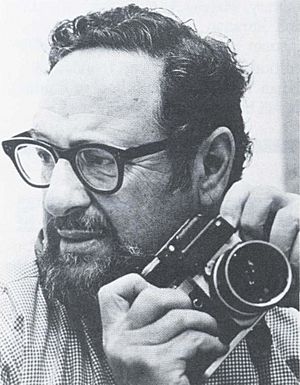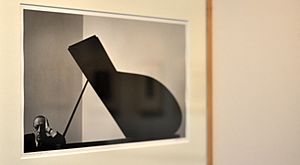Arnold Newman facts for kids
Quick facts for kids
Arnold Newman
|
|
|---|---|

Newman self-portrait, c. 1981
|
|
| Born |
Arnold Abner Newman
March 3, 1918 |
| Died | June 6, 2006 (aged 88) |
| Nationality | American |
| Known for | Portrait Photography News Photography Photography Teacher |
|
Notable work
|
Fortune Life Newsweek |
| Movement | Environmental Portraiture (founder/coined phrase) |
| Awards | Infinity Award (1999) Lucie Award (2004) |
Arnold Abner Newman (March 3, 1918 – June 6, 2006) was a famous American photographer. He was best known for his special way of taking pictures called "environmental portraits." This meant he photographed people like artists and politicians in their own surroundings. He showed things that were important to their lives and work. He also took amazing pictures of objects, arranged in an artistic way.
Contents
Arnold Newman's Early Life and Photography Career
Arnold Newman was born in Manhattan, New York. He grew up in Atlantic City, New Jersey, and later moved to Miami Beach, Florida. In 1936, he started studying painting and drawing at the University of Miami.
After two years, he couldn't afford to continue his studies. So, in 1938, he moved to Philadelphia to work in a photo studio. There, he took portraits for a very low price.
Newman went back to Florida in 1942 to manage a portrait studio in West Palm Beach. Three years later, he opened his own photography business in Miami Beach. In 1946, Newman moved to New York City. He opened Arnold Newman Studios and worked as a freelance photographer. He took pictures for popular magazines like Fortune, Life, and Newsweek.
Becoming a Famous Photographer
Newman found his unique style by understanding artists and their work. He photographed many famous people. These included Marlene Dietrich, John F. Kennedy, Pablo Picasso, Marilyn Monroe, and Audrey Hepburn.
He believed that even if someone didn't know the person in the picture, the photograph itself should still be interesting.
Newman is famous for inventing and using "environmental portraiture." In this style, the photographer uses the background and objects around the person to show their life and work. For example, he took a well-known picture of composer Igor Stravinsky. In the photo, the lid of Stravinsky's grand piano looks like a giant musical note. This represents the music he created.
Newman usually photographed people in places they knew well. He included things that showed their jobs and personalities. A musician might be photographed in their recording studio. A politician might be pictured in their office. He used a special camera and tripod to capture every small detail.
Newman once said, "I didn't just want to make a photograph with some things in the background. The surroundings had to add to the picture and help people understand the person." He added, "No matter who the subject was, it had to be an interesting photograph."
Most of Newman's best-known pictures were in black and white. However, he also took many photos in color. His 1946 black and white portrait of Stravinsky at a piano became his most famous image. He was also one of the few photographers allowed to take a picture of Henri Cartier-Bresson, who usually avoided cameras.
One of Newman's famous color photos is from 1963. It shows a German industrialist named Alfried Krupp in one of his factories. Newman admitted that his personal feelings influenced how he showed Krupp in the picture.
Newman also taught photography at Cooper Union for many years. On December 19, 2005, he took his last official portrait of director James Burrows. This was special because Newman had photographed James's father several times before. Arnold Newman passed away on June 6, 2006, in New York.
Awards and Honors
- 1985: Missouri Honor Medal for Distinguished Service in Journalism from the University of Missouri.
- 1999: Infinity Award for Master of Photography from the International Center of Photography.
- 2004: Lucie Award for Outstanding Achievement in Portrait Photography.
- 2004: The Royal Photographic Society's Centenary Medal and Honorary Fellowship. This was for his important contributions to photography.
- 2006: Newman was added to the International Photography Hall of Fame and Museum.
See also
 In Spanish: Arnold Newman para niños
In Spanish: Arnold Newman para niños
 | Chris Smalls |
 | Fred Hampton |
 | Ralph Abernathy |


